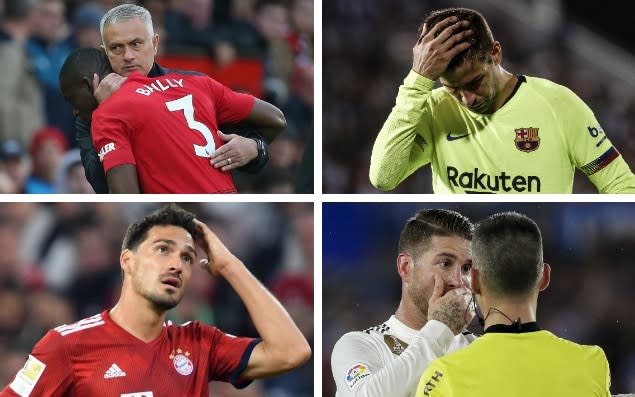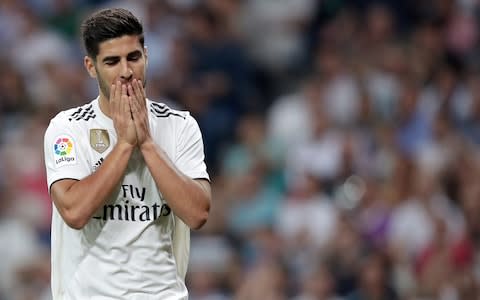Why are Europe's four richest clubs - Man Utd, Barcelona, Real Madrid and Bayern Munich - struggling in the league?

We could call it ‘the curse of Forbes’ if the problems of the four “most valuable soccer teams in the world” were not piffling compared with all but a handful of other clubs. Back in June, when the plutocrats’ bible announced that Manchester United, Barcelona, Real Madrid and Bayern Munich remained exclusive members a clique worth more than £2bn, it would not have envisaged that by the first week of October each of them would have the word “crisis” attached to them in some degree or other, albeit in most instances hysterically.
Manchester United are eighth in the Premier League having equalled their worst beginning to a season for 29 years, Barcelona are second in La Liga, winless in four league matches and enduring their slowest start for 12 years, Real Madrid are one point further behind in fourth following defeat by Alaves while Bayern Munich, Bundesliga champions for the past six seasons, were thumped 3-0 at home by Borussia Monchengladbach on Saturday night which left them in sixth and looking suitably sober at their annual pilgrimage to the Oktoberfest on Sunday.
READ MORE: Yarmolenko offers to fight pundit who criticised him
READ MORE: Five signings who are impressing and five with it all to prove
READ MORE: Carvajal - Neymar said he’d sign for Real Madrid
Given that Manchester United despite three defeats are only seven points behind Manchester City, Barcelona and Real Madrid one and two points respectively short of Sevilla and Bayern Munich four off Borussia Dortmund, these are not so much ‘first world problems’ as minor inconveniences to the superyacht class, a tiny splinter of exquisite Malabar teak in the sole from promenading the deck moored off Portofino.
Manchester United’s flaws are more ingrained than the other three imperial giants and they are further behind their domestic and continental rivals but they do share common characteristics, principally a failure to invest in defenders that has exposed all the failings of their veterans. Barcelona, the one club that did buy a new centre-half, Clément Lenglet, inexplicably dropped him after his impressive performance against Spurs and replaced him with Thomas Vermaelen for the match against Valencia.
The former Arsenal captain was making only his 27th league appearance in his fourth season at Camp Nou in a career blighted by injuries for the past eight years and his last start came in the defeat by bottom of the table Leganes in September. Once again he made an error, compounded by Gerard Pique’s maverick judgment, and Barcelona were 1-0 down within two minutes. Lionel Messi rescued them again but the inconsistency and unreliability of the defence in Samuel Umtiti’s absence forces them to conquer their own failings as well as the opposition.

At Real Madrid Sergio Ramos’s impetuosity was evident in the 3-0 defeat by Sevilla and the 1-0 loss at Alaves, the full-backs Dani Carvajal and Marcelo are injured and the left-back playmaker’s absence has left them unbalanced and tetchy, like a swan with a broken wing. A squad is a coalition of personalities and factions, none more so than the European champions’. Marcelo is their mood enhancer and energiser and his absence was particularly noticeable in their flaccid 1-0 defeat by CSKA Moscow in the Champions League.
Bayern Munich’s World Cup-winning centre-back, Mats Hummels, is betraying his chronic lack of pace and Jerome Boateng’s brittleness over the past four seasons (which makes Jose Mourinho’s reported desire for Manchester United to bid £50m for him irrational) leaves them vulnerable. Niklas Süle has eclipsed them both and is now de facto first-choice but it would be worth repeating Jupp Heynckes’ experiment from last season against Hannover and play him as a defensive midfielder. It’s not a long-term solution for their new manager, Niko Kovac, but he doesn’t have the luxury of that perspective right now because Javi Martínez has lost form and zip and Thiago Alcantara looks as stilted and doubtful in the role as his compatriot Cesc Fabregas was at Chelsea.
Manchester United’s defensive deficiencies have been well chronicled and it is plain to see that each player they have tried in the centre over the past couple of seasons - Phil Jones, Chris Smalling, Marcos Rojo, Eric Bailly and Victor Lindelof - have ineradicable inadequacies that are revealed over time. They also have glaring weaknesses at full-back, having never recovered from Louis van Gaal’s ditching of players with defence-first instincts to deploying converted wingers or promising gallopers such as Luke Shaw who never seems properly switched on when facing up to runners rather than chasing them down.
Inconsistency breeds rotation and every one of the four has been rattling through the changes. It’s easy enough to blame a World Cup hangover for this but instead it is more driven by a search for fluency. Barcelona, for example, bought Philippe Coutinho specifically to play the Andres Iniesta role but the purchase of Arthur, a rhythmic passer and space invader who is inspiring tiki-taka revivalists to greet him as the second coming of Xavi, means Coutinho having to play in the No11 position with Ivan Rakitic coming over from right to left to play behind him.
Coutinho is a wonderful player yet Ousmane Dembélé, a proper wide forward who was as good as Kylian Mbappé before his injury last season, now can’t get into the starting XI despite his manifest growing confidence that he belongs in the company of Messi and co. It has also angered Arturo Vidal, a box-to-box trooper, bought as an upgrade on the forceful Paulinho who scored nine league goals last season, and has been stuck on the bench. Last week at Wembley, his response to not making the starting XI was to tweet an enraged emoji. He is not usually so figurative in his expressions and, amusingly, a man who literally has ‘never give up’ tattooed across his adam’s apple appears to be in a monumental strop about it.
READ MORE: City tactics a compliment to Liverpool - Van Dijk
READ MORE: Juve rule out move to re-sign Paul Pogba
Julen Lopetegui, the man who jeopardised the goodwill of the whole nation by taking the Real Madrid job while Spain manager and had such a tin ear that he was surprised by being sacked on the threshold of the World Cup, has also rung the changes. Not only is he rotating his goalkeepers Thibaut Courtois and Keylor Navas between competitions in a doomed attempt to placate the latter, he has also used Luca Modric and Casemiro from the bench.
Dani Ceballos has been used in midfield, Marco Asensio has been given the impossible job of starting in Cristiano Ronaldo’s position and Isco, who had to have his appendix out a fortnight ago, has left a creative void that cannot be plugged by efficiency. Real, flaky on their journey to Kiev last season, never lacked exuberance when it clicked. This season they look joyless, a sin that Florentino Pérez who needs the team to swagger to sustain his financial high-wire act, cannot countenance for long.

Bayern Munich’s first instinct last spring was to lobby Jupp Heynckes to stay on and only turned to Eintracht Frankfurt’s Kovac when the 73-year-old caretaker turned them down after winning his fourth Bundesliga title. He has tried to mitigate the impact of ageing on once key players - particularly the ‘Robbery’ wing twins and to a certain extent Thomas Muller - by switching to a 4-1-4-1 but hasn’t found the right midfield combinations. His bosses let Vidal depart for Barcelona, sold Sebastian Rudy and signed just Leon Goretzka on a free, bargaining that the return from loan spells of Serge Gnabry and Renato Sanches was adequate.
Gnabry has outplayed Franck Ribéry when picked in his place, Goretzka shows signs of fulfilling his potential as the heir to Michael Ballack but needs to score more goals and there are glimmers of hope that Sanches is emerging from his rut. But Thiago Alcantara is too frequently overrun as the pivot and is wasted in that position, James Rodriguez has not been fully fit and injuries suffered by Kingsley Coman and Corentin Tolisso have reduced Kovac’s stock of dynamic players.
In La Liga Real Madrid have gone 409 minutes without scoring and are feeling the absence of Cristiano Ronaldo and his 311 goals in 292 appearances keenly. Even in his worst season he scored 25 league goals but more fundamentally the need to make the most of him changed the way that Karim Benzema played. The centre-forward left Ronaldo to do the explosive running while doing his hounding for him and making all those supporting and defence-distracting bursts. Benzema scored five times last season and already has four in eight games this, demonstrating that he can contribute more when he is not playing second foil.

Robert Lewandowski has scored three goals in six games for Bayern, his slowest start for six years. Unlike Benzema, who is exiled from the France national team, Lewandowski did play at the World Cup yet it was hardly a physically taxing experience for the wretched Poland. Romelu Lukaku, who did go deep into the tournament, has looked listless in recent weeks for Manchester United while Luis Suarez is enduring a similarly sluggish start as last season with three goals from eight league starts.
By the time the international break ends Barcelona will have gone a month without a Liga victory but their ‘problems’ are the least pressing of the four clubs. Ernesto Valverde lacks charisma and his caution has drained some of the singular exhilaration of their play in the league. Their pinnacles - the attacking performance against Tottenham most notably - are still beyond the grasp of everyone else but the goals they conceded at Wembley, like the ones in the Champions League defeat by Roma last season, reveal the old worrying signs of fragility that Umtiti’s return alone will not solve.
Real Madrid and Bayern Munich are bedding in new managers and beginning to realise that postponing rebuilding work for so long makes the consequences more dramatic when they all catch up with you at once. Both have powerful dressing rooms, run by ‘Duques’ and ‘Herzogs’, who are backing Lopetegui and Kovac for now but there is also the danger at clubs where boards defer to players with political clout that they can also hold new managers hostage and prevent them from making necessary changes. With Antonio Conte and even Arsène Wenger available, not to mention Heynckes’s susceptibility to an appeal to his conscience by Uli Hoeness, pledges of sticking by their managers to ‘the bitter end’ are vacuous and easily demolished by results.

Jose Mourinho may be more secure in his position than either of them but that’s because his club is in a bigger mess. Barcelona, Real Madrid and Bayern Munich at least have experienced executives in their playing and football planning departments, a semi-permanent civil service that controls the direction. They may all have centre-forwards who are relatively out of sorts, defences that are prone to error and are whirring through midfield combinations in a quest for coherence. But only Manchester United have had five years of turmoil in the league, three managers with distinct approaches who have each contributed to an alarmingly lopsided squad of dubious quality, a complete breakdown of trus and an executive board that has authority without guile or the gumption to employ it.

